Ezra Benjamin | Confessing the Hebrew Scriptures – The Lord Almighty, Pt. 1
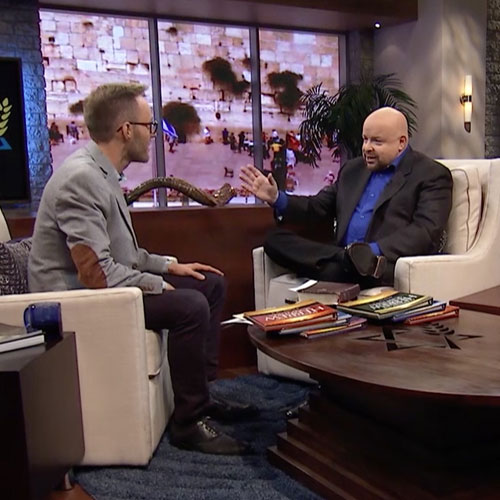

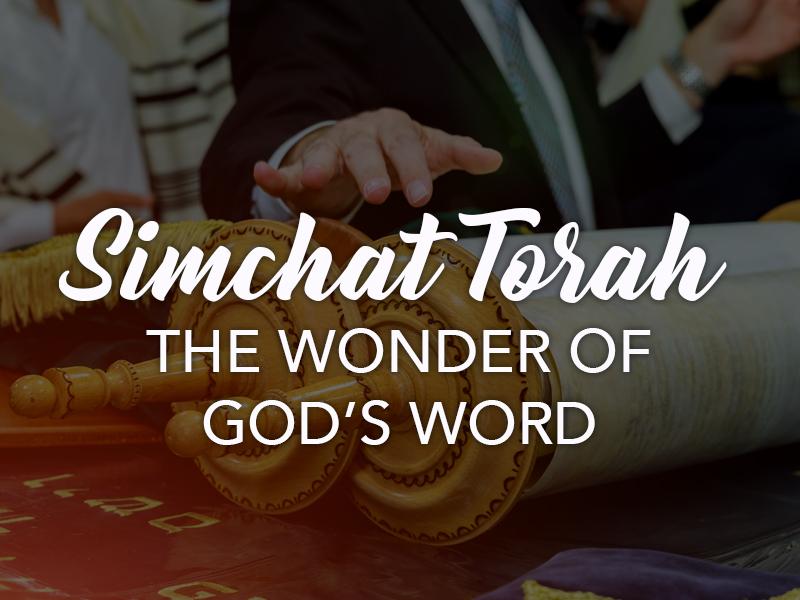
The almighty, all-powerful God of the universe has communicated to us. The One who created all things, loves us perfectly, and sent His Son Yeshua (Jesus) to bear the penalty for our sin, has spoken to us! We have a whole book of His words!
Simchat Torah is a day set aside to celebrate this wonder.
Simchat Torah means “joy of the Torah.” Each week throughout the year, Jewish people around the world read a weekly Scripture portion from the Torah, the first five books of the Hebrew Scriptures. This parasha (par-a-SHAH) unites them together as they each read the selected passages, week-by-week, from Genesis to Deuteronomy.
Simchat Torah marks the completion of these annual Torah readings. During the morning service of Simchat Torah, worshipers read the last parasha of the year in Deuteronomy. In the evening, the annual cycle begins again with the first reading from Genesis. Simchat Torah includes festive dancing and singing while as many people as possible take turns carrying the Torah scroll around the synagogue or public squares. It is truly a joyous celebration of God’s Word to mankind.
While the Torah is specifically the Pentateuch, the first five books of the Hebrew Scriptures, the word means “instruction” and is also applied to the remainder of the Holy Scriptures in the Tanakh or Old Covenant. As Messianic Jews, we understand God’s instruction encompasses the New Covenant Scriptures as well, and ultimately Yeshua Himself (Hebrews 1:1‒2), who is the Word made flesh (John 2:14).
Simchat Torah calls our attention to the precious value of the Scriptures and reminds us that God’s Word given to us is the reason for great joy.
In the West, nearly every store selling books also carry Bibles. Many Believers own more than one, and if you visit any thrift store, you’ll likely find free Bibles donated by people who have more copies than they need. The Bible is on the internet, and we can even download it to our phones ensuring that we always have it with us.
A 2016 survey by LifeWay Research revealed that 87% of American households owned a Bible. Yet, of the Evangelical Believers surveyed, only 49% read God’s Word each day. In many parts of the world, persecuted Believers don’t have the privilege of owning a Bible. They can’t afford one, don’t have the internet, or Bibles are banned in their regions. They can’t read for themselves what God has said ‒ and they have an insatiable hunger to know His Word.
When we hold the Bible in our hands, we hold a miracle. God’s Word is inspired. It is “God-breathed” and alive with His Spirit.
“For the word of God is living and active and sharper than any two-edged sword – piercing right through to a separation of soul and spirit, joints and marrow, and able to judge the thoughts and intentions of the heart.”
―Hebrews 4:12
“All Scripture is inspired by God and useful for teaching, for reproof, for restoration, and for training in righteousness, so that the person belonging to God may be capable, fully equipped for every good deed.”
―2 Timothy 3:16
God’s Word meets us in our need. It reveals that we have an eternal inheritance waiting for us to which this world cannot be compared (Ephesians 1:18, 1 Peter 1:4).
It tells us God loves us (Romans 5:8) and we can do all things through Yeshua who strengthens us (Philippians 4:13).
God’s Word lifts our spirits when life is hard, reminding us that God has overcome the world (John 16:33).
It assures us He is with us always (Matthew 28:20).
It instills hope and reminds us God has good plans for us (Jeremiah 29:11), and He is for us (Psalm 56:9, Romans 8:31).
His Word speaks to our hearts inviting us to rest in His love (Matthew 11:28, 1 John 4:18) and know that with Him, all things are possible (Matthew 19:26) – even getting through our present difficulty with peace (Philippians 4:6‒7).
God’s Word sustains us (Deuteronomy 8:3, Matthew 4:4).
Let’s rejoice and thank God for this amazing gift. Celebrate by diving into the Word of God and rededicating yourself to feasting on it daily. You will find encouragement, wisdom and hope for each new day. You will find God Himself there.
Study the Torah the first five books of the Bible through the eyes of a first-century disciple. “Teachings of the Torah” invites you into the questions, stories, and interpretations that prove the Bible is a living book.
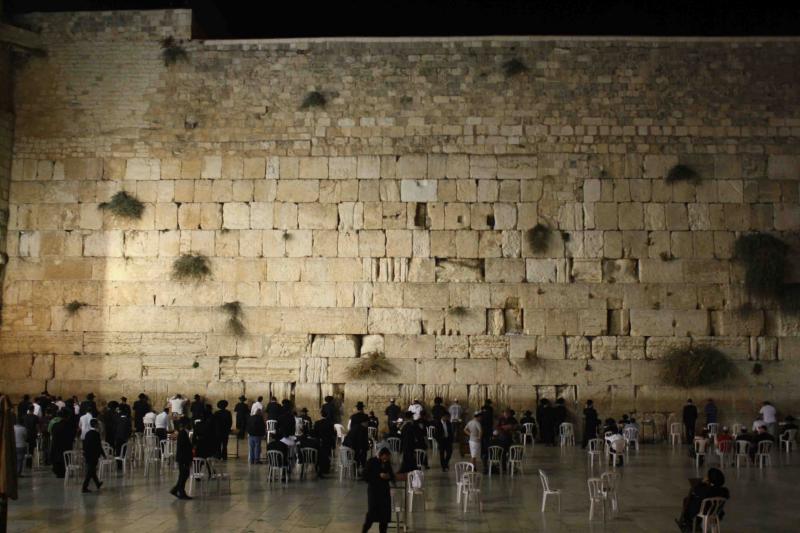
The story is told that King Frederick the Great of Prussia once asked his physician to give him proof for the existence of God.
His physician replied, “Your Majesty, the continued existence of the Jews.”
It’s true. The Jewish people are the most persecuted people in history. From the Book of Esther, down through all the centuries, there have been repeated attempts to destroy them.
No other group has been so persecuted. Yet still the Jewish people miraculously survive.
Before 1948, almost no one was convinced the Jewish people, after centuries of wandering, could return to Israel and reclaim their ancient homeland. But they did.
Then, almost no one believed the new State of Israel, surrounded by enemies, would long survive. But survive it did, amazingly winning a long series of wars and conflicts that continue today.
Few people initially had faith God would fulfill His ancient promise to reestablish the Jewish people in Israel.
But today, many Christians understand and support the State of Israel and the Jewish people as a fulfillment of biblical prophecy – and an important step towards the eventual return of Yeshua (Jesus) the Messiah.
But despite this enthusiasm and support, most Christians still know very little about what life is like in modern Israel, or the hunger for the Messiah that God has placed in the hearts of the Jewish people there.
You see, I – and all of us here at Jewish Voice Ministries – have realized that God’s miraculous plans for the Jewish people go well beyond the reestablishment of the Jewish homeland in Israel.
I believe God has placed a desire – a deep hunger – in the hearts of Jewish people, especially in Israel. And that desire is to meet and come into a loving relationship with the Messiah, the one we know as Jesus of Nazareth.
We see the evidence of this every day in our work among Jewish people in Israel.
Recently, we were ministering through one of our partner agencies along a beach in Israel, when our team was approached by a young Israeli man. Interested in what our team was doing, he said he was a “secular Jew” (that is, non-religious), but he often came to the beach to think about spiritual things.
Clearly, he had a hunger for God. It’s just that he didn’t know what to do with that hunger.
Our team welcomed him and said they, too, thought often about God and spiritual things. And they began to tell him about Yeshua.
After a while, the young man said the Good News seemed like what he had been looking for – as though the puzzle pieces had begun to fall into place for him.
Praying right then and there, the young man accepted Yeshua as his savior. We were able to connect him with one of the Messianic Jewish congregations in the area.
This is just one story of how Jews in Israel are hungry – desperately hungry – to find answers to their spiritual questions. We see examples of this kind of openness to Yeshua every day!
But spiritual hunger by itself is not enough. We must make the effort to tell the Jewish people of Israel what they so desperately need to hear.
As the Apostle Paul wrote:
How then shall they call on the One in whom they have not trusted? And how shall they trust in the One they have not heard of? And how shall they hear without someone proclaiming? And how shall they proclaim unless they are sent? As it is written, “How beautiful are the feet of those who proclaim good news of good things!” (Romans 10:14-15, TLV)
Paul is very clear here. No matter how much spiritual hunger the Jewish people have, they still cannot and will not accept Yeshua unless we who believe go to them, share the Good News and introduce them to God’s Son.
That evangelistic mission is at the core of everything Jewish Voice does, in all our ministries around the world.
And right now we see tremendous opportunity to bring Jewish people to Yeshua in Israel, among the many secular Jews living there.
We clearly see the spiritual need in Israel. And every day we see the blessings that come from sending ministry workers there, to befriend and share hope with the people – to “proclaim good news of good things.”
But the need is great. And right now the workers are too few.
Jewish Voice has committed almost $1 million to support the efforts of Messianic congregations and ministry organizations in Israel. Working alongside these committed Believers, we see every day the blessing they are bringing to spiritually seeking Jews.
But we are only able to support these efforts in Israel, and to see the Jewish people there coming to Jesus, because of the prayers and gifts from you and our many other Jewish Voice partners.
So I’m bold to ask: Will you give now to help share the Good News with Jewish people in Israel?
Of course, I’m not asking you to provide ALL of the $1 million we’ve committed to share our faith in Israel – although that would be another miraculous blessing!
All I’m asking is that you give as generously as possible, knowing your gift will translate into Jewish people hearing about Yeshua’s great love for them.
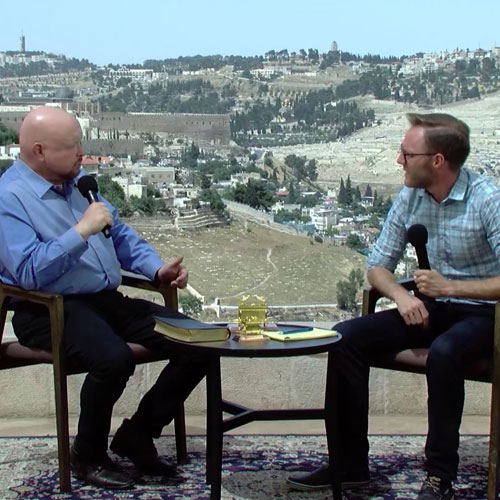
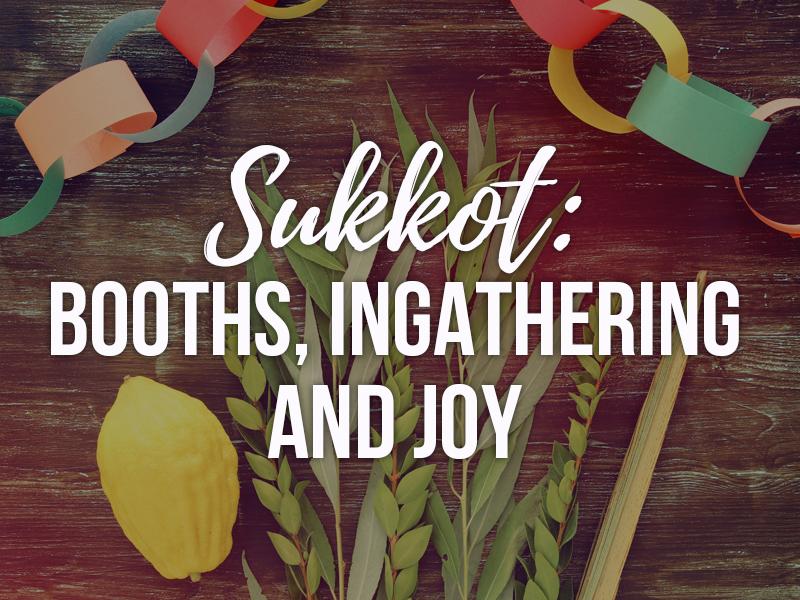
Sukkot (Soo-KOTE) is a seven-day feast commanded by God in Leviticus chapter 23. The Hebrew word sukkot and the word “tabernacles” both mean “booths.” So the holiday is also known as the Feast of Booths and the Feast of Tabernacles. Because Sukkot is also a harvest festival, it is sometimes called the Feast of Ingathering. Sukkot is the only moad (MO-ehd), or “appointed time,” in which God commands His people to rejoice and celebrate. Therefore, the week-long feast is also called The Season of Our Joy (Leviticus 23:39‒44).
God instructed Israel to abstain from work and meet together in a holy assembly on the first day of Sukkot. On each of the seven days, the Jewish people were to bring various sacrifices and offerings as well as celebrate with the waving of branches from four species of plants. One of the most interesting aspects of Sukkot is God’s command to live in temporary shelters for the week.
During Sukkot, God instructs Jewish families to leave the comfort of their homes and live in booths “so that your generations may know that I had the sons of Bnei-Yisrael to dwell in sukkot when I brought them out of the land of Egypt” (Leviticus 23:43).
Rabbinic tradition says that a sukkah (SOUH-kah) can be three-sided with walls constructed of any material. The roof, however, must be made with organic matter, such as leafy branches.
The booths of Sukkot provide a tangible reminder of how our Jewish ancestors lived in the wilderness. Through the loosely woven roof, one can look up and see the night sky, remembering God’s promise to make Abraham’s descendants as numerous as the stars.
These booths also remind us of how God took care of the Israelites during their years of wandering. He fed them with manna from heaven, gave them sweet water from a rock and kept their shoes and clothing from wearing out for 40 years.
Today, Jewish people around the world build sukkot in their backyards or on balconies, taking their evening meals, relaxing, entertaining guests, and even sleeping there. Sukkot are often decorated by hanging fresh fruit from the ceiling as a symbol of God’s provision and care.
During synagogue services, special ceremonies and prayers are performed including waving a lulav (LOO-lahv) bouquet, a gathering of leafy branches made from the four specific species outlined in Leviticus 23:40. The grouping includes a citrus-like fruit called the etrog (ET-trog), lulav (palm branches), willows called aravot (AR-a-vote), and myrtle.
Discover the meaning and wonder of Rosh Hashanah, Yom Kippur, and Sukkot with this specially designed infographic.
As a harvest festival, Sukkot is also called the Feast of Ingathering and celebrates God’s provision in the present. It is one of three biblical feasts in which each physically-able Jewish male was to go to Jerusalem and present a harvest offering at the Temple. Bringing the first of one’s harvest displayed trust that God would provide enough to last through the season until the next reaping.
Sukkot is filled with reasons to rejoice. We remember God’s sustaining power toward the Israelites in the desert. We rejoice in His faithfulness to keep His promises. And we thank Him for His bountiful provision today. Still, there are more reasons for joy at Sukkot.
Sukkot also celebrates God’s presence with us. In the wilderness, the Israelites dwelled in tents. So too did God’s presence – in the Holy of Holies of the Tabernacle, and later in the First and Second Temples. God told Moses, “My presence will go with you, and I will give you rest” (Exodus 33:14). Moses, vividly aware of this precious and critical gift, replied, “If Your presence does not go with me, don’t let us go up from here!” (Exodus 33:15).
Messianic Jews and other Believers in Yeshua (Jesus) receive the Holy Spirit, God’s presence with us always, as a gift when they place their faith in Yeshua. Jesus promised that He would never leave us and be with us always through the “Comforter” and “Helper” sent by God (John 14:6, 26). Sukkot celebrates the incomparable gift of God’s presence with us in the Holy Spirit.
Additionally, each of the Lord’s feasts contains a foreshadow of prophecies of the Messiah. The prophetic pictures in the Spring feasts have been fulfilled by Yeshua’s first coming, and the Fall feasts will reveal their completion with His future return. Sukkot will see its fulfillment when God gathers the elect from all over the world into His kingdom to dwell with Him forever. (See Matthew 24:31 and Revelation 21:1, 3).
In 2018, Sukkot begins at sunset on September 23 and ends at nightfall on September 30.
May your Sukkot season be filled with all joy as you celebrate God’s provision, promises and presence in your life.
Discover how easy it is for you to celebrate the Fall Feasts that God prescribed in the Bible.
A small Bedouin settlement sprung up recently in the West Bank area of Israel. There were no permissions or permits obtained, and the structures were illegal. As prescribed by law, Israeli officials made plans to dismantle it.
But then last week, the Palestinian Authority (PA) filed a claim with the International Criminal Court in The Hague regarding “Israel’s plans to raze a West Bank Bedouin village,” The Jewish Telegraphic Agency reported. Once again, Israel was cast in a misleading light depicting her as the villain.
Not all weapons used against Israel are bombs or flaming kites. Everything related to the settlement was just one more example of “lawfare” – another tool in the multifaceted and ongoing terrorism against Israel and the Jewish people. It’s an ongoing strategy of waging legal warfare, or using the law to fight Israel.
Lawfare is defined as an attempt to damage or delegitimize an enemy by tying up their time and resources fighting legal and public relations battles. The PA and nations that refuse to acknowledge Israel’s right to exist consistently fight her with lawfare.
Step one of this form of lawfare is to force Israel to defend herself or enforce her own laws to her detriment. In addition to the Bedouin settlement example, another well-documented instance of recent lawfare was the Gaza terror group Hamas paying individuals to riot at the Israeli border fence this summer. Civilians stormed the fence, launched lethal and damaging incendiary devices into Israel and used other forms of violence to force Israel to defend herself.
Then comes step two: Use international news media to present Israel as the unlawful aggressor in the court of public opinion.
Step three involves filing a claim against Israel with the ICC, which the PA has done numerous times since it became a member in 2014.
The Palestinian Authority has pushed the Court to open a war crimes case “(ever) since it submitted its first files against Israel in June 2015, shortly after it signed onto the Rome Statute in December 2014,” The Jerusalem Post recently reported.
In its 2017 summary report, the ICC said it had reviewed thousands of pages of PA material to determine “whether there is a reasonable basis to proceed with an investigation” against Israel.
The United Nations Development Assistance Framework (UNDAF) has earmarked millions of dollars for the five years from January 1, 2018, through December 31, 2022, specifically to help the Palestinian Authority use the International Criminal Court against Israel.
“UNDAF provides training and technical advice so that Palestinians can effectively access international accountability mechanisms and hold Israel accountable for its violations under international law,” according to a UNDAF document outlining its assistance to the PA that The Weekly Standardreported on last December.
“This is yet another example of the U.N.’s shameful hostility towards Israel, which encourages more false attacks, accusations and criticism of our close ally,” The Weekly Standard quoted Senator Ted Cruz (R-TX) as saying in the same article.
An intergovernmental organization and international tribunal that sits in The Hague in the Netherlands, the ICC was formed in 2002 under the Rome Statute, a treaty serving as the ICC's foundational and governing document. Countries ratify the Rome Statute to become members of the ICC. To date, there are 123 member states.
Israel is not one of them. Neither is the U.S.
That’s because both Israel and the U.S. refuse to subjugate their citizens to an international tribunal that they believe is political in nature.
In a speech last week to the Federalist Society in Washington D.C., U.S. National Security Adviser John Bolton referred to the ICC as an “illegitimate court” that is “ineffective, unaccountable and – indeed – outright dangerous.”
“If the court comes after us, Israel or other U.S. allies, we will not sit quietly,” Bolton threatened. He further said the court “is already dead to us.”

Rejoicing over God’s Past Provision Sukkot (Soo-KOTE) is the only moad (MO-ed), or “appointed time,” during which God commands His people to rejoice. It may seem like an unusual instruction. Can you command joy? Isn’t it, instead, a spontaneous, involuntary response?
By reading God’s instructions about Sukkot, we can understand that joy can be a choice as well as a response. Intentional rejoicing begins with choosing to contemplate things worth celebrating.
Sukkot reflects back to God’s provision for the Jewish people in the wilderness after He led them out of Egypt. Not only did He free them from slavery, He also gave them clean water from a rock and sustained them with a mysterious food they called manna. For 40 years, the people wandered in the desert. In all that time, neither their clothing nor their sandals wore out.
At Sukkot, we rejoice over this care God gave to the Israelites in the wilderness. Repeatedly in the Scriptures, God instructs Israel to remember what He has done for them. Doing so fostered courage, hope, and joy in the hearts of His people.
“God’s deeds and works make the heart glad and soul sing for joy.”
―Psalm 92:5
The Feast of Booths, Sukkot, offers us the occasion to reflect on how God has provided for us in our own lives as well. Think about the “deeds and works” God has done in your life through the years. Remember ways He sustained you through various hardships. Call to mind the prayers He answered that changed your circumstances – or changed you.
On this first day of Sukkot, may God fill your heart with joy for all that He has done for Israel and for you in.
Rejoicing over God’s Current Provision Some blessings in our lives are so constant that it’s easy to forget they are gifts. God gave a unique instruction for observing the Feast of Sukkot (Soo-KOTE) that can help us remember. We are to build and live in a sukkah (SOUH-kah), or “booth,” for the week-long festival. In Leviticus 23:43, He explained His purpose: so that the people of Israel ‒ and all subsequent generations ‒ would remember that God made Israel live in tents when He brought them out of the land of Egypt.
Historically, Sukkot was also an agricultural festival requiring Jewish people to make a firstfruits offering from the fall harvest. While they remember how God met the needs of their ancestors, Israel also rejoiced in His provision for their lives in the present day.
As we consider the children of Israel and all that God did for them in the wilderness, we can’t help but compare our lives to theirs. Today, most of us enjoy a wide variety of daily food choices, and we are never far from safe drinking water. We own multiple sets of clothing and live in homes with several comfortable rooms that offer us more-than-adequate shelter from the elements. Sukkot urges us to not only be grateful for these gifts, but to rejoice over them. Even these ordinary provisions remind us that every gift from God is a great thing.
“The Lord has done great things for us, and we are glad.”
―Psalm 126:3
God goes far beyond making sure our physical needs are met. He is intimately involved in each of our lives to nurture and mature us, and to equip us for His work. He has a purpose for each one of us, and He strengthens us to fulfill His calling in our lives. This Sukkot, as you celebrate God’s material provision for you, choose joy by also reflecting on His spiritual provision and how He is working in your life today. Rejoice!
Rejoicing over God’s faithfulness
God promised Abraham that He would make his descendants like the stars – so vast in number they’d be virtually countless. How outlandish those words must have seemed to a 75-year-old man and his 65-year-old, barren wife. Yet, today, we know that God kept that promise. There are now more than 14 million Jewish people in the world. When added to the generations across the millennia since the birth of Isaac, son of the promise, the numbers are beyond calculation.
The starry sky, seen through the leafy roof of a sukkah (SOUH-kah), testifies to God’s faithfulness. He is our rock, steady and true. He never changes, and His love remains. The everlasting God keeps His covenants and fulfills all His promises.
“Know therefore that Adonai your God, He is God ‒ the faithful God who keeps covenant kindness for a thousand generations with those who love Him and keep His mitzvot.”
―Deuteronomy 7:9
“For Your love is higher than the heavens, Your faithfulness reaches to the clouds.”
―Psalm 108:5
Celebrating God’s faithfulness is a vital part of our Sukkot joy. We know that He has been faithful to Israel (Psalm 94:14), and He will be faithful to us today as well (1 Thessalonians 5:24). God’s Word tells us that He will complete the work He began in us (Philippians 1:6) and that He will never leave us (Hebrews 13:5). Even “if we are faithless, He remains faithful, for He cannot deny Himself” (2 Timothy 2:13).
On this third day of Sukkot, rejoice in God’s faithfulness to Israel and to Believers in Messiah Yeshua (Jesus). Take a few moments to also reflect on ways He has proved Himself faithful to you. May your joy overflow as you recall His steadfast love and power in your life.
Discover the meaning and wonder of Rosh Hashanah, Yom Kippur, and Sukkot with this specially designed infographic.
Increasing joy
Rejoicing is both spontaneous and deliberate. We’ve been exploring ways to choose joy through intentional reflection and thanksgiving. Is it also possible to cultivate natural joy? Can we participate with God in fostering our increasing joy?
The Bible indicates that joy is not only a fruit of the Spirit, but it is also a fruit of trusting God.
“Though you have not seen Him, you love Him. And even though you don’t see Him now, you trust Him and are filled with a joy that is glorious beyond words.”
―1 Peter 1:8
When we placed our faith in Yeshua (Jesus) as the Messiah, we trusted Him with our need for a Redeemer. As a result, we experienced the joy of being reconciled to God.
Joy is also generated when we trust God day by day. As we lay our needs and concerns in His hands, trusting His will for the outcomes, our hearts rest in His love, wisdom and power toward us. Joy and peace follow.
“Adonai is my strength and my shield. My heart trusts in Him, and I was helped. Therefore my heart leaps for joy, and I will praise Him with my song.”
―Psalm 28:7
“Now may the God of hope fill you with all joy and shalom in trusting, so you may overflow with hope in the power of the Ruach ha-Kodesh.”
―Romans 15:13
Sometimes, trusting God is easier to understand than it is to accomplish. But etting go and truly trusting Him can be difficult in certain areas of our lives. As part of your Sukkot (Soo-KOTE) celebration, think about how God might be calling you to deepen your trust in Him. When you accomplish that, His joy will be waiting for you.
Rejoicing over God’s atonement
Just five days after the most solemn day of the Jewish year, Yom Kippur (YOHM Kip-POUR) – the Day of Atonement – God commands a week of rejoicing at Sukkot (Soo-KOTE). God covered the sins of Israel once a year on Yom Kippur. He required remembrance and rejoicing to follow soon afterward.
During Sukkot, we celebrate God’s provision for us, His faithfulness to keep His promises and His presence with us. These gifts are most vividly revealed in the complete atonement available to us in Messiah Yeshua (Jesus). As we receive the salvation Yeshua offers, God welcomes us, forgives us, cleanses us from sin and gives us eternal life, filling us with joy.
“But the angel said to them, “Do not be afraid! For behold, I proclaim Good News to you, which will be great joy to all the people.”
―Luke 2:10
Through the course of everyday life as we encounter various discouragements and challenges, we can lose sight of this joy. King David did when he came face-to-face with the ugliness of his sin (2 Samuel 11‒12). In Psalm 51, he pleaded with God: “Restore to me the joy of Your salvation and sustain me with a willing spirit.”
We can rekindle this joy by reflecting on the magnitude of Yeshua’s sacrifice and what it gained for us. On this fifth day of Sukkot, may your heart overflow with thankfulness for your salvation. You have been reconciled to God and have been given eternal, abundant life in Yeshua. That’s cause for rejoicing!
Rejoicing over God’s presence
In the wilderness, God’s presence dwelled with the Israelites, first in the pillars of cloud and smoke and later in the tabernacle. The Feast of Booths invites us to celebrate God’s ancient presence with His people in the wilderness as well as his presence with us today.
God’s presence with us has and continues to be among His greatest gifts. Through the Holy Spirit, God makes His home in the hearts of Believers. We have available to us perpetual access to the God of all creation along with His wisdom, guidance, comfort, and power. God’s presence also offers us joy.
“… Abundance of joys are in Your presence, eternal pleasures at Your right hand.”
―Psalm 16:11
God is incomparable. His purity and goodness are matchless. His greatness is unsearchable and His power immeasurable. His love is endless. He has reconciled us to Himself through Yeshua (Jesus) so that we may come into His presence and know that He Himself is the source of overflowing joy.
“I will come to the altar of God, to the God of my exceeding joy, and praise You upon the harp ‒ O God, my God.”
―Psalm 43:4
As you take time to intentionally rejoice during the Feast of Sukkot (Soo-KOTE), may you discover true joy in fellowship with God, delighting in His presence and celebrating His immense love.
Rejoicing over our eternal home
God requires the Jewish people to live in “booths” during the Feast of Sukkot (Soo-KOTE) so they will remember the living conditions of their ancestors in the wilderness (Leviticus 23:43). The children of Israel hadn’t yet entered the Promised Land, which was to be their permanent home, so until then, God had them live in tent-like, temporary housing.
Believers in Yeshua (Jesus) know that this earthly world is not our true home. The bodies we live in are temporary, a shadow of what is to come. The apostle Paul called them tents.
“For we know that if the tent, our earthly home, is torn down, we have a building from God – a home not made with human hands, eternal in the heavens.”
―2 Corinthians 5:1
Each of God’s moadim (mo-eh-DEEM), the “appointed times” of His feasts, contains a prophetic picture of something the Messiah would fulfill later. The time is coming when the Jewish people will recognize Yeshua as the promised Messiah, and “all Israel will be saved” (Romans 11:25‒26). When that takes place ‒ when Yeshua returns to gather His elect ‒ we will receive new, heavenly bodies and dwell with God throughout eternity.
According to Paul, these new bodies will not be mere tents, but “buildings” – our permanent housing. The temporary structures of our earthly lives will be replaced with strong eternal homes in God’s presence forever.
That calls for rejoicing! This is Sukkot joy.
Sukkot celebrates the gift of God’s presence now and for eternity when our joy will be made full. May you carry your Sukkot joy into every day from now until then.
Discover how easy it is for you to celebrate the Fall Feasts that God prescribed in the Bible.
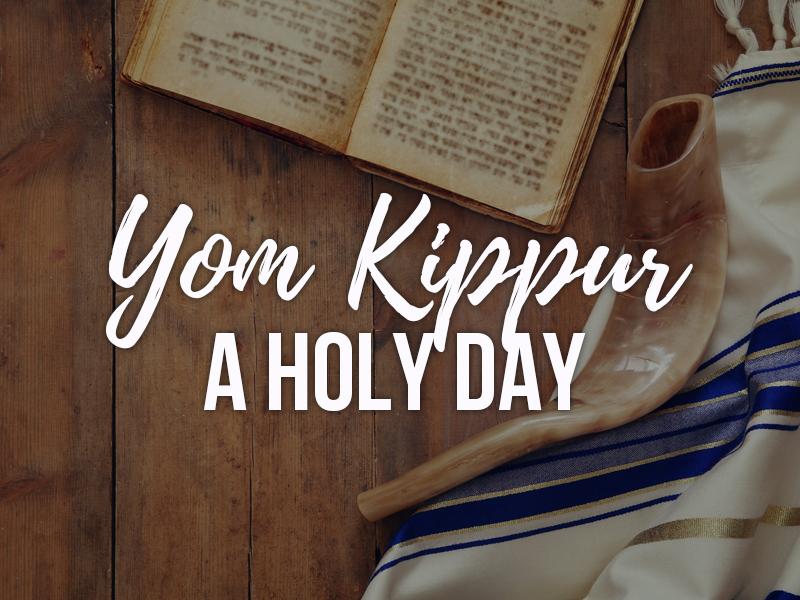
During the days of the tabernacle and Temples, it was the one day of the year when the high priest entered into the Holy of Holies. He came bringing the blood of sacrifices, first for his own sins and those of his family, then for all Israel.
The Holy of Holies was a curtained-off area of the tabernacle or Temple containing the Ark of the Covenant and the very presence of God. If the priest did not do his service according to God’s commands, he could die. Sin is serious to God, and the Day of Atonement is a serious day.
Jewish people prepare for Yom Kippur during the 40 days preceding it. Beginning in the Hebrew month of Elul, Jewish hearts turn inward with self-examination before God to identify, confess and repent of their sins.
Jewish tradition teaches that on the first day of the month of Tishrei – which is Rosh Hashanah, the “head of the year” – God pronounces judgment on each Jewish person for the following year. Ten days later, at Yom Kippur, He seals it.
The period between the two holidays is known as the Days of Awe, and during them, introspection reaches its most intense of the season, culminating on Yom Kippur.
Biblical instructions for observing the Day of Atonement are found in Leviticus chapters 16 and 23 as well as Numbers chapter 29. They include four things. We are to:
Come together in a sacred assembly
Bring sacrifices and offerings
Do no work
Afflict ourselves
The Bible is not specific regarding what it means to afflict oneself. Jewish people fast from food and water for 25 hours at Yom Kippur and also abstain from various pleasures. They do no work on Yom Kippur, and it is the most important day of the year to attend synagogue.
The final element of observing the Day of Atonement has not been possible for nearly 2,000 years. When the Second Temple was destroyed in 70 A.D., the sacrificial system ceased. Today’s Judaism substitutes Temple sacrifices with prayer, repentance (teshuvah, teh-SHOO-vah) and tzedakah (tzeh-DAH-kah), which means works of righteousness or charity.
Messianic Jews observe Yom Kippur with fasting, prayer, abstaining from work and attending congregational services. Messianic Jews recognize that Yeshua (Jesus) has made complete atonement for our sins. His blood not only makes available a covering for sin but is also able to cleanse our conscience (Hebrews 9:13–14). The names of those who believe in Him and receive His sacrifice are sealed in the Book of Life through the Holy Spirit.
For Messianic Jews, Yom Kippur is a solemn day to acknowledge the high cost of our sin and stand before God in humble gratitude for His provision of forgiveness, cleansing and eternal life through the Messiah Yeshua.
This year, Yom Kippur begins at sunset on Tuesday, September 18 and ends at sundown Wednesday, September 19.
Discover the meaning and wonder of Rosh Hashanah, Yom Kippur, and Sukkot with this specially designed infographic.